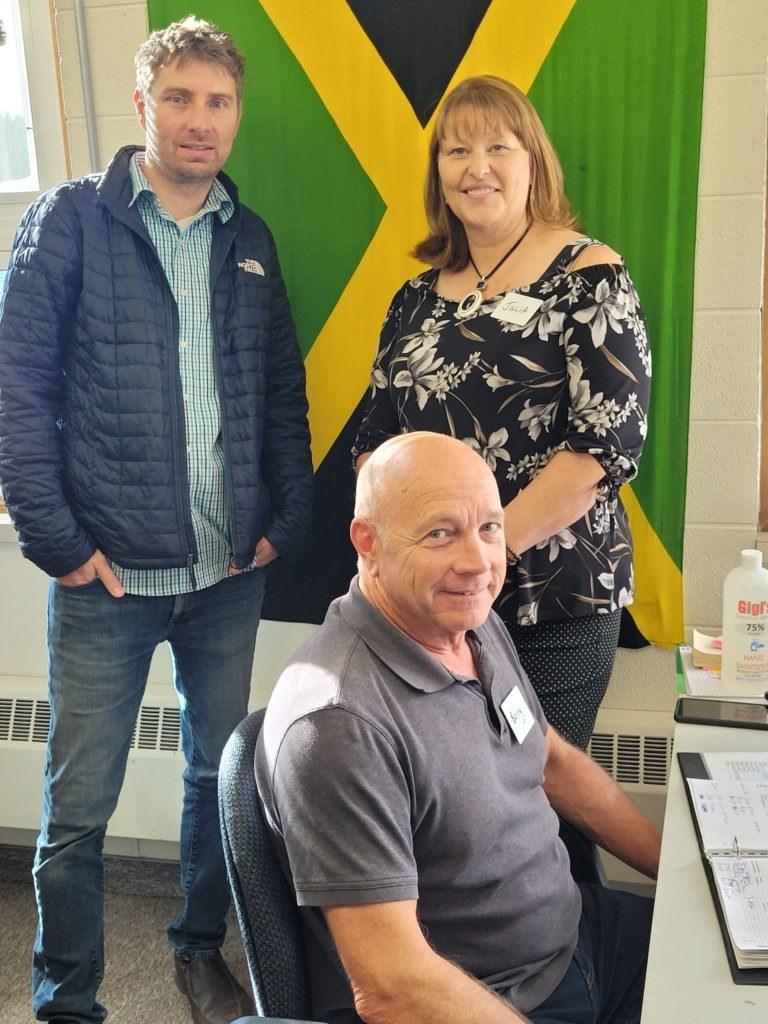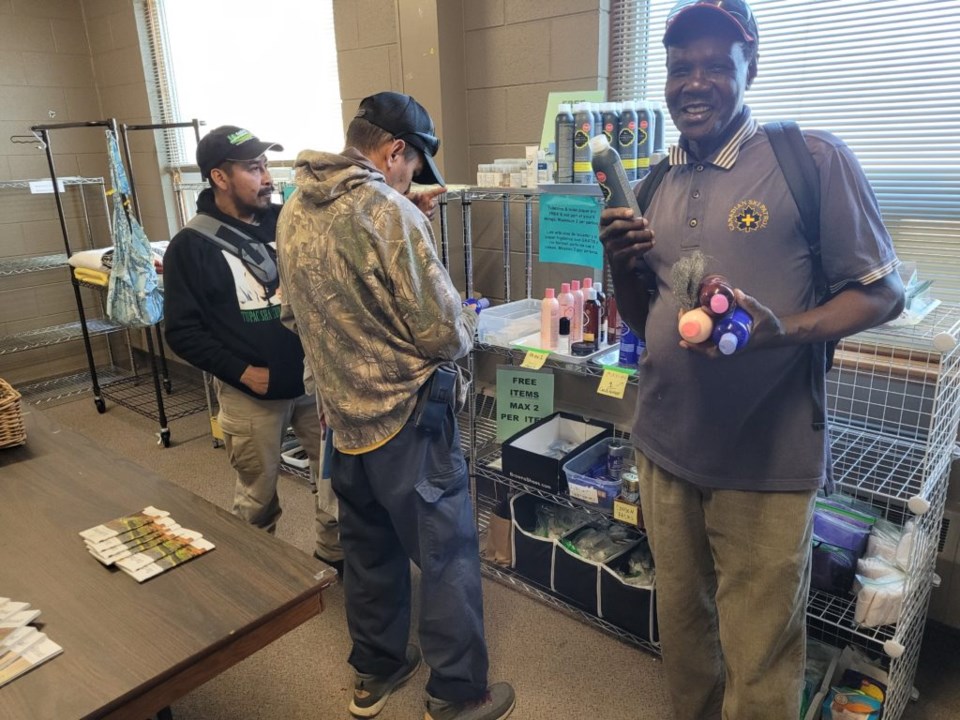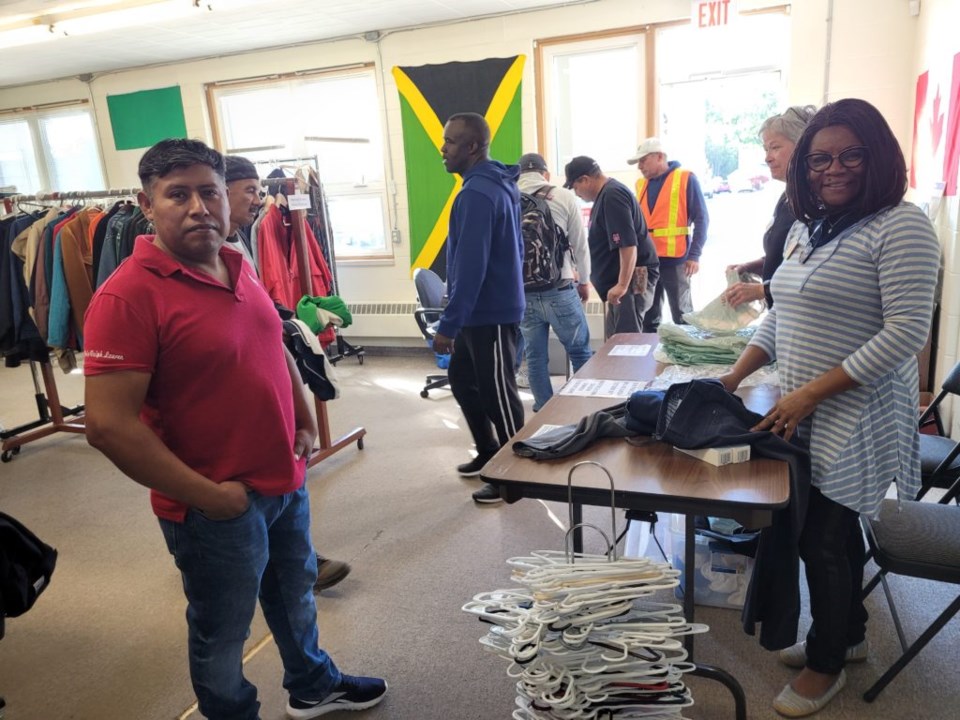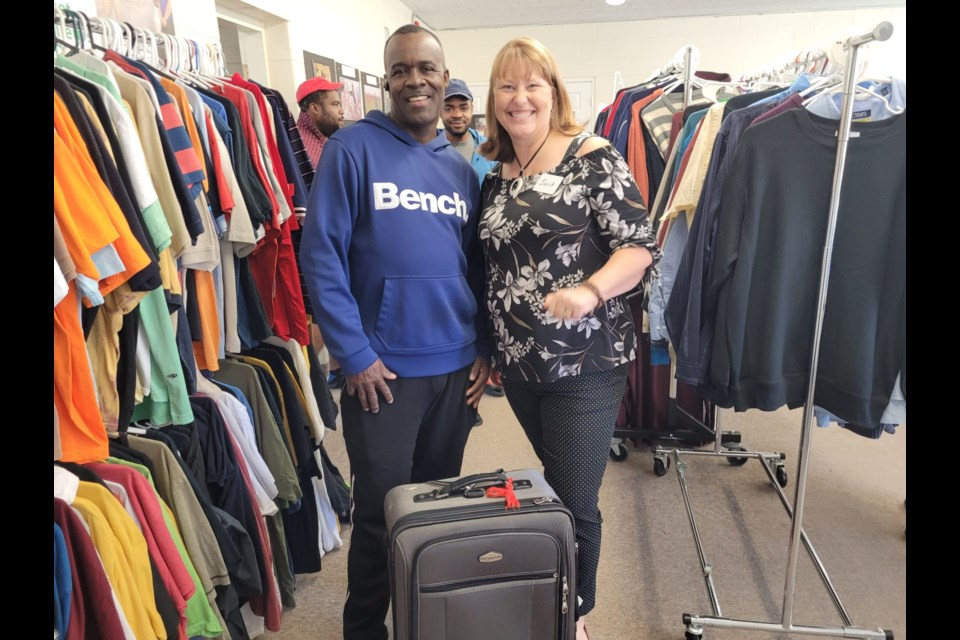This Sunday will be the final day of the season for The Farmworker Hub, giving volunteers some much-needed time to catch their breath and prepare for next spring.
It’s been a busy season, says organizer Julia Buxton-Cox, with an average of about 150 farmworkers visiting the hub every Sunday, for food, clothing, personal hygiene supplies and small household items, all at no charge.
This past Sunday, there was a line-up of about 20 people waiting at Cornerstone Community Church on Niagara Stone Road for the 2 p.m. opening — in mid-summer, there might be 80 workers waiting.
As Buxton-Cox shouted out “hola, bienvenidos,” to her friends from local farms, greeting them by name with a warm welcome and cheerful smile, it was easy to see why it’s such a popular spot.
It’s not just that it’s a central location for farmworkers’ services, within a 15-minute bike ride from the majority of farms, with the grocery store across the street and Bikes for Farmworkers up the road — it’s the friendly, positive vibe created by volunteers that is very evident on this Sunday. Barry Newcombe is signing in those who arrive at the door to keep records used as planning tools for the hub, Zena Samuels and Janet Guy check out the workers when they’re done, and on this last visit to the hub for many of them, they chat with each other and Buxton-Cox about when they’re leaving and where they’re headed.
“What I’m most proud of,” she says, “is the friendships that have developed here.”
She was first introduced to farmworkers who come to Niagara-on-the-Lake for up to 10 months a year when she accompanied Jane Andres, a local volunteer immersed in helping farmworkers, deliver welcome bags.
The bags provide necessities such as food and toiletries as the agricultural workers arrive from Mexico and the Caribbean until they can get out to do some shopping. The welcome bags were especially important the two years the men arrived during COVID, and shopping was difficult.
Buxton-Cox then began searching for a way to do more, and the hub was created in March, 2021, to fill the void still caused by the pandemic, when farmworkers were facing their second season of limited access to retail outlets or charity shops to purchase food, warm clothing, and other supplies.
She used the NOTL Buy Nothing group on Facebook, to gather warm clothes, which were sorted and delivered to local farms, until provincial restrictions were lifted and the doors of a portable in the church parking lot opened in July 2021.
This season, the hub is located in a room inside the church which had been used for youth group meetings — the young people were given a larger, comfortable space upstairs, where church services used to be held, and which is now part of the NOTL Youth Campus.
In the four and a half months the hub operated last season, 1,900 farmworkers dropped in, says Buxton-Cox. This year, with just a week left to go, they’re up to 2,800, from 78 farms, and 96 bunkhouses — mostly men.
There is one area with women’s clothes, for the 40 or so women who drop by regularly. The rest of the space is used for men’s clothing, household items, and in separate rooms, work boots and shoes, and some toiletries — with the season winding down, stock is low, shelves waiting to be filled again next year.
There is also a desk with a laptop and printer for anyone who needs forms printed and filled out, and information is given to workers about how to access legal services if needed, and how to use Niagara Region transit.
Upstairs, the former church offices have been converted into offices for doctors and nurses associated with Quest Community Health Care, which offers services to farmworkers across the region.
“Some workers come because they can’t get to doctors’ offices during their working week,” says Buxton-Cox. “Others just like the privacy of seeking medical care here.”
The word most often heard this Sunday, though, is from those searching for “maletas.” Buxton-Cox pointed to another small storage area where several suitcases were tucked away in a corner, most reserved, with labels on them indicating the farmworkers who would be picking them up as they prepared to head home this week. For some who have arrived on bicycles, she makes sure she knows their addresses, planning to drop off their suitcases when the hub closes — it’s too dangerous to cart them home on bikes, she tells them.
Andrew Niven, director of marketing for Konzelmann Estate Winery, has dropped by to take a tour of the operation, and can’t get over how impressive it is, not only in its efficiency, but because it is so much more than a place to pick up clothes or other items — it is a hub that meets all kinds of needs, including a place to connect with friends.
And it’s impossible, Niven says, to imagine anyone other than Buxton-Cox could have created and maintained such an amazing space. Her passion and dedication to the work of the hub as she chats with such an upbeat, positive attitude is key to the welcoming atmosphere. And by the reaction of all who walk through the door, it is clearly appreciated.
That she speaks Spanish is a definite bonus, if not a necessity — that has to be an important part of putting her Mexican friends from the farm at ease and feeling appreciated and respected for all they do for the community.
“This is not about charity,” stresses Buxton-Cox. “Our goal is to envelop the community, the farmers and the workers, and to make the workers feel part of the community. This is about friends helping friends.”
Niven was at the hub to see first-hand what it offers. He recognizes farmworkers are essential to grape growers — without them there would be no wine industry, and he wants to help.
“As a wine industry we want to support our agricultural workers,” he says. And as a member of Wineries of Niagara-on-the-Lake, an association of local wineries, he has developed an initiative that is a step in that direction.
Since April, the wineries have been offering a Winemakers’ Selection Tasting Pass for $35 per person, which allows one tasting of a Winemaker’s Selection wine at each winery any Monday through Friday for the rest of the year.
Niven says for the month of November, all proceeds from the $35 pass will go to the Farmworker Hub, to help put it in a better financial situation to get through the winter and open when farmworkers return. As well, it will raise awareness for residents of the importance of farmworkers to the finished product, “while they’re enjoying what’s in our own backyard.”
The two main financial concerns, says Buxton-Cox, “are rent and food insecurity.” The hub paid about $1,000 a week to purchase food for seven weeks, and even then had to limit each worker to three items.
She is very grateful for the space made available in the church building, for which they gladly pay $1,000 a month toward the upkeep of the building. “Cornerstone has been very good to us. We couldn’t do this without their support,” she says.
The hub has been managing with funds received from a grant that came about through a partnership with Gateway Community Church, she says, and of any money left over after the rent is paid, “100 per cent of it goes to food.”
But the grant money is gone, and the hub needs to secure funds for the future. In addition to donations, such as the generous offer by Niven, she is looking for a church or other charitable organization to partner with that can write grants to benefit the hub.
When asked by Niven what more she would like to be able to accomplish, she describes her vision of the grass-roots, non-profit organization as one that can do more to address issues of food insecurity and poverty. Food costs have almost doubled, and food that is culturally appropriate is hard to find, and expensive, she says.
She would love to see farmers donate any unsaleable produce, such as peaches and peppers, to give to workers. Those who pick peaches would love the peppers, and those who help to grow peppers would appreciate the peaches, she explains.
“If we can help our workers save even $5 on food, that’s $5 more they can send home to their families for education for their kids.”
Also important to her is expanding on education in the community to further an understanding of deeply-rooted racism, and she would like to be able to offer learning experiences for workers, improving their literacy skills — she hears from some that they would like to be better at reading and writing.
For more information on the fundraiser go to wineriesofniagaraonthelake.com and look for the Winemakers Selections Tasting Pass details.
For those interested in helping the hub, Buxton-Cox asks that they call her at 905-483-9717, or even better email [email protected] .
Although the hub is closing Sunday for the winter season, “we will still need to have warm winter coats, pots and pans and men’s jeans/work pants, size 32-36 for next season,” she says.
Anyone interested in helping with a new dedicated volunteer driving team next season, picking up donations, delivering them to farms and bringing workers to The Farmworker Hub, can apply at https://www.thehubnotl.ca/get-involved
“We do need financial support to keep the doors open next season,” she adds. “Donations can be made through our website https://www.thehubnotl.ca/donate. However, I’d love to meet with new donors in person and can arrange tours during the off-season.”



